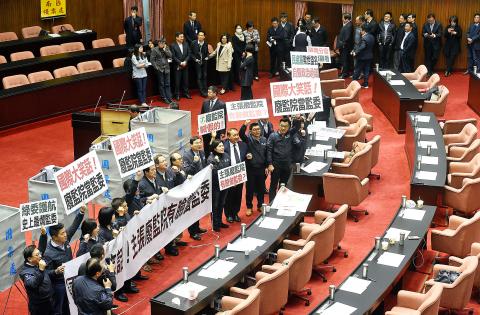All of the Democratic Progressive Party’s (DPP) 11 Control Yuan member nominees were approved by the legislature yesterday in a vote that went along party lines.
Former Judicial Reform Foundation chief executive officer Kao Yung-cheng (高涌誠), former Presidential Office secretary-general Chen Shih-meng (陳師孟), former Taiwan Association for Disability Rights secretary-general Wang Yu-ling (王幼玲), former minister without portfolio Lin Sheng-feng (林盛豐), National Yang Ming University public health professor Peter Chang (張武修), former Taipei Department of Legal Affairs commissioner Yang Fang-ling (楊芳玲), former judge Tsai Chung-yi (蔡崇義), former Taipei Awakening Foundation director-general Yang Fang-wan (楊芳婉) and former DPP legislators Tien Chiu-chin (田秋堇), Walis Perin and Chao Yung-ching (趙永清) all secured at least 70 “yes” votes from the 73 lawmakers who voted.
Walis Perin garnered the most “yes” votes with 73.

Photo: Chu Pei-hsiung, Taipei Times
The Chinese Nationalist Party (KMT) caucus called the approvals “shameless” and an “international joke.”
The DPP used to vilify the Control Yuan, but now that it has the right to nominate its members, the post has suddenly generated renewed interest, KMT caucus secretary-general Lin Wei-chou (林為洲) said.
It is evident from the question-and-answer sessions on Monday and Friday last week that what used to be criticized by the DPP as an obsolete agency and the “appendix” of the constitutional system has enticed nominees, all of whom were eager to assume the post, Lin said.
Chen said that the Control Yuan was “junk,” but that “it can be reused,” Lin said.
“Does a job whose responsibility is to reuse junk justify a monthly salary of NT$190,000?” he asked, referring to the Control Yuan members’ salary.
Lin said the KMT caucus unilaterally agreed that none of the nominees can be justified and KMT lawmakers decided against exercising their right of investiture during the vote.
If President Tsai Ing-wen (蔡英文) is serious about carrying out constitutional reforms, she should have waited until the legislature finished discussing the issue before deciding whether to make nominations, KMT caucus deputy secretary-general Lee Yen-hsiu (李彥秀) said.
Rushing to make nominations only shows that the DPP treats the position of Control Yuan member as a tool for its pork-barrel politics, she said, expressing the concern that the new members might override the judiciary on behalf of the DPP.
KMT Legislator Alicia Wang (王育敏) panned Chen for saying that he would take action against judges who were allegedly biased against members of the pan-green camp — including former president Chen Shui-bian (陳水扁) — while deliberating on cases.
Chen Shih-meng, while being questioned by KMT lawmakers on Monday, said he believed the former president is a victim of judicial persecution.
Chen Shih-meng’s remarks were no different from trampling on the nation’s judiciary, Alicia Wang said, questioning Tsai’s resolve to push for judicial reforms for nominating someone so biased against the judiciary.
The People First Party abstained from voting yesterday, while New Power Party legislators Huang Kuo-chang (黃國昌), Hsu Yung-ming (徐永明), Kawlo Iyun Pacidal and Freddy Lim (林昶佐) voted.
KMT Legislator Chen Chao-ming (陳超明), the only KMT member who cast votes, said he voted only for Walis Perin and not for the rest.
KMT caucus whip Lin Te-fu (林德福) said he would report to KMT headquarters Chen Chao-ming’s defiance of the caucus’ agreement to withdraw from voting, recommending punishments.

Alain Robert, known as the "French Spider-Man," praised Alex Honnold as exceptionally well-prepared after the US climber completed a free solo ascent of Taipei 101 yesterday. Robert said Honnold's ascent of the 508m-tall skyscraper in just more than one-and-a-half hours without using safety ropes or equipment was a remarkable achievement. "This is my life," he said in an interview conducted in French, adding that he liked the feeling of being "on the edge of danger." The 63-year-old Frenchman climbed Taipei 101 using ropes in December 2004, taking about four hours to reach the top. On a one-to-10 scale of difficulty, Robert said Taipei 101

A preclearance service to facilitate entry for people traveling to select airports in Japan would be available from Thursday next week to Feb. 25 at Taiwan Taoyuan International Airport, Taoyuan International Airport Corp (TIAC) said on Tuesday. The service was first made available to Taiwanese travelers throughout the winter vacation of 2024 and during the Lunar New Year holiday. In addition to flights to the Japanese cities of Hakodate, Asahikawa, Akita, Sendai, Niigata, Okayama, Takamatsu, Kumamoto and Kagoshima, the service would be available to travelers to Kobe and Oita. The service can be accessed by passengers of 15 flight routes operated by

Taiwanese and US defense groups are collaborating to introduce deployable, semi-autonomous manufacturing systems for drones and components in a boost to the nation’s supply chain resilience. Taiwan’s G-Tech Optroelectronics Corp subsidiary GTOC and the US’ Aerkomm Inc on Friday announced an agreement with fellow US-based Firestorm Lab to adopt the latter’s xCell, a technology featuring 3D printers fitted in 6.1m container units. The systems enable aerial platforms and parts to be produced in high volumes from dispersed nodes capable of rapid redeployment, to minimize the risk of enemy strikes and to meet field requirements, they said. Firestorm chief technology officer Ian Muceus said

MORE FALL: An investigation into one of Xi’s key cronies, part of a broader ‘anti-corruption’ drive, indicates that he might have a deep distrust in the military, an expert said China’s latest military purge underscores systemic risks in its shift from collective leadership to sole rule under Chinese President Xi Jinping (習近平), and could disrupt its chain of command and military capabilities, a national security official said yesterday. If decisionmaking within the Chinese Communist Party has become “irrational” under one-man rule, the Taiwan Strait and the regional situation must be approached with extreme caution, given unforeseen risks, they added. The anonymous official made the remarks as China’s Central Military Commission Vice Chairman Zhang Youxia (張又俠) and Joint Staff Department Chief of Staff Liu Zhenli (劉振立) were reportedly being investigated for suspected “serious